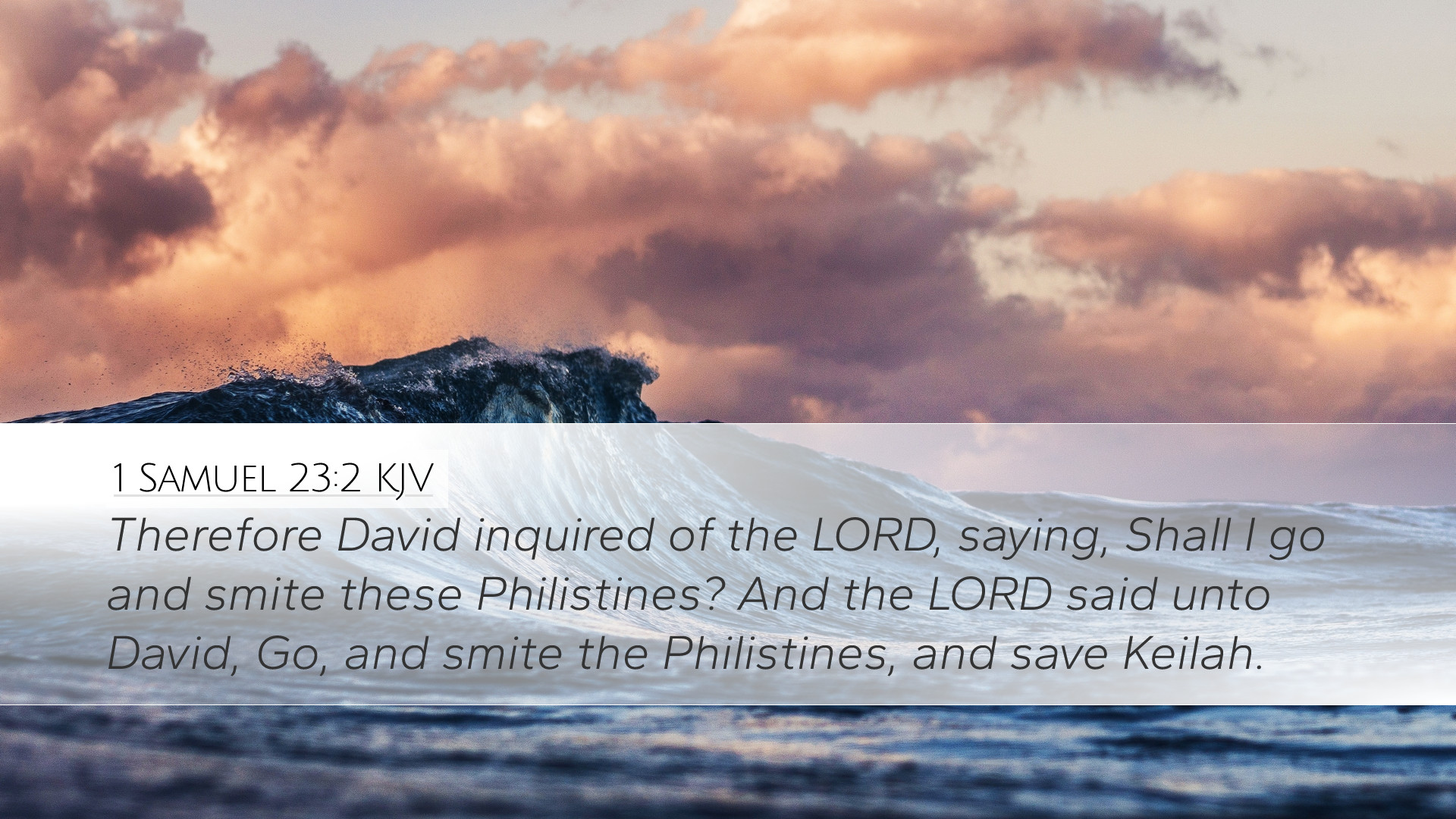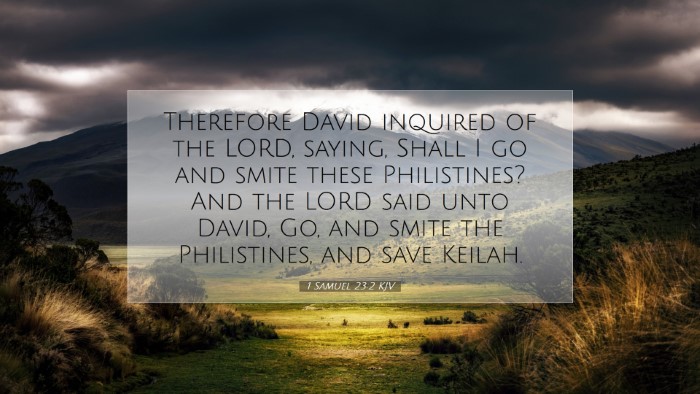Bible Commentary on 1 Samuel 23:2
1 Samuel 23:2 states, "Therefore David inquired of the Lord, saying, 'Shall I go and attack these Philistines?' And the Lord said to David, 'Go, and attack the Philistines and save Keilah.'" This verse encapsulates a critical moment in David's early leadership and his reliance on God's guidance.
Contextual Background
To fully appreciate the significance of this verse, it is essential to understand the context in which David found himself. David, at this time, was on the run from King Saul, who sought to kill him due to jealousy and fear of David’s rising popularity. David had gathered a band of followers and was moving through the wilderness when he learned about the plight of the city of Keilah, a city under threat from the Philistines.
Insights from Matthew Henry
Matthew Henry, in his commentary, emphasizes the importance of David's inquiry to God before taking action. He notes:
- Seeking Divine Guidance: Henry remarks that David's first action was to consult God. This underscores the necessity of prayer and seeking divine guidance before making critical decisions. David exemplifies how a leader should act with a conscious dependence on God.
- God's Assurance: The Lord's response to David serves to reassure him that his efforts to save Keilah were not in vain. Henry points out that God’s promises empower His servants to act against overwhelming odds.
- Leadership Responsibility: Henry also reflects on the weight of leadership that falls upon David. He interprets David’s willingness to save Keilah as a reflection of his character as a shepherd who cares for the sheep, which is a precursor to his future role as king over Israel.
Insights from Albert Barnes
Albert Barnes offers a pastoral perspective on this passage, highlighting several themes:
- Prayer and Decision-Making: Barnes emphasizes that the act of praying before making decisions is a crucial habit for Christians. He notes that David’s inquiry is a model for believers, teaching that every significant action should be framed in prayer.
- The Nature of God’s Guidance: Barnes explains that God’s answer was clear and immediate, showcasing His readiness to support those who seek after His own heart. God’s willingness to respond to David implies a relationship built on faith and trust.
- Valuing Human Lives: In the face of threats, Barnes notes David's concern for the people of Keilah. This reflects a critical aspect of leadership—being attuned to the needs and safety of others, which is vital in any faithful ministry context.
Insights from Adam Clarke
Adam Clarke's commentary provides a more theological reflection on the implications of David’s actions:
- God’s Sovereignty: Clarke points out that the context of David’s inquiry reveals God’s sovereign hand over the affairs of nations. The ability of David to inquire of the Lord demonstrates a personal relationship with God and the belief in His active involvement in human activities.
- Historical Significance: Clarke notes that the events surrounding Keilah and the Philistines can be seen as foundational for understanding the ongoing battles faced by Israel. David’s victory becomes a testament to God’s faithfulness to His people.
- Spiritual Warfare: Clarke reminds readers that physical battles often parallel spiritual struggles. Thus, David’s decision to engage with the Philistines can symbolically represent the ongoing battle between good and evil that believers face today.
Theological Reflections
This verse and the surrounding narrative raise several theological themes worth considering:
- Prayer and Action: The balance between prayer and proactive engagement in doing God’s will is a significant theme. Christians are called to seek God’s wisdom through prayer but also to act decisively based on His guidance.
- Divine Authority in Leadership: David’s leadership is marked by a divine mandate, illustrating the Christian doctrine of calling. Leaders should not only rely on their skills but also on God’s direction to carry out their mission.
- Protection of the Vulnerable: God's concern for the city of Keilah through David's intervention underscores the biblical mandate to defend the weak and vulnerable, a guiding principle for Christian ethics.
Conclusion
1 Samuel 23:2 serves as a profound reminder of the interplay between divine guidance and human action. The insights garnered from public domain commentaries illustrate that effective leadership is undergirded by a robust prayer life, a commitment to protecting those in need, and a reliance on God's promises. As pastors, students, theologians, and scholars reflect on this text, they are encouraged to emulate David’s example of seeking God’s direction in all their endeavors.


